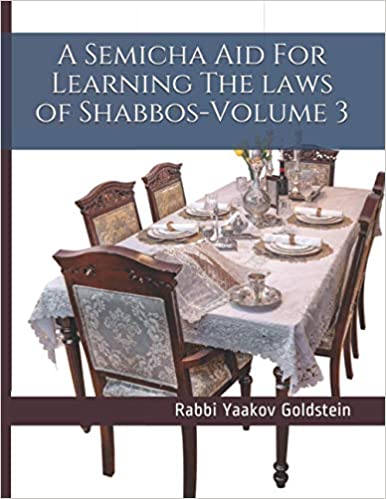
To purchase this Sefer, click here
13. Warming up one’s wet body near a fire:[1]
Pouring cold water on one’s body and heating it near a fire:[2] A person may not rinse his entire body in cold water and heat himself opposite a fire because by doing so he warms up the water that is on him and it is considered as if he has washed his entire body in hot water.[3] [This applies even if the water will not reach Yad Soledes. However, according to this opinion, one may rinse minority of his body in cold water and then heat it near a fire to below Yad Soledes, as this is not considered a complete form of bathing.[4] However, even according to this opinion, one may not bathe minority of his body with water that was heated on Shabbos to even below Yad Soledes, as this is considered a complete form of bathing which is completely prohibited on Shabbos according to all.[5] However, other Poskim[6] rule that according to this opinion, one may bathe minority of his body in hot water heated on Shabbos in a permitted way.]
Pouring cold water on one’s hot body:[7] However one is allowed to rinse himself off with cold water after having heated up [his body] near a fire because the [cold] water that [will be poured] on him will not get so hot [to be considered that he has bathed in hot water].
Warming up one’s wet hands:[8] There are opinions[9] which say that even one who washes his hands needs to be careful not to heat it up opposite a fire [or any source of heat[10]] even from an area where [the water on him will] not [reach] Yad Soledes[11], if one did not previously dry himself very well.
Their reasoning is:[12] because by doing so he warms up the water that is on [his hands] and it is thus like he has bathed in hot water that was heated on Shabbos and hot water which was heated on Shabbos even in a permitted way is forbidden to wash even one limb and even if the [water] was only slightly heated that it is not Yad Soledes.
The Final Ruling: One is to be strict like this latter opinion.
| Summary: One may not dry his hands near a source of heat as doing so heats up the water on his hands and transgresses the Bathing prohibition.
Q&A May one warm his wet hands near a heater on Shabbos? No. This applies even if the water on his hands will not reach Yad Soledes.
Warming one’s hands near the flames of Shabbos candles Question: [Thursday, 11th Shevat 5782] In the winter, when I come back from Shul on Friday night my hands are freezing. May I warm them by placing them near the Shabbos candles?
Answer: Yes. There is no halachic issue to warm dry hands near the Shabbos candles on Shabbos. However, wet or moist hands may not be warmed next to the candles. Rather, one is to first dry them well using a towel, and only then warm them near the fire. Explanation: Unlike the Chanukah candles, there is no prohibition against benefiting from Shabbos candles, and on the contrary its entire purpose is for benefit and one who does not benefit from it is considered to have said a blessing in vain. Now, although there are certain restrictions in regard to reading next to lit candles on Shabbos, this is due to worry that one may come to tilt to the lamp, which is un-applicable worry when it comes to simply warming one’s hands near the flame. Likewise, from the fact that the Poskim discuss and debate whether it is permitted to warm wet hands near a flame on Shabbos due to the issue of warming the water, proves that if the hands are dry there is no issue at all. Practically, while we are stringent regarding wet hands, there is no reason to be stringent regarding dry hands. Sources: See regarding benefiting from the Shabbos candles: Admur 263:1; 11; 13; see regarding the restrictions of making use of candles on Shabbos: Admur 275:1; Michaber 275; Mishneh Shabbos 11a see regarding warming one’s wet hands near a flame: Admur 326:4; Michaber 326:4-5; Shabbos 40b; Tur; Rosh 3:9; Mordechai 305; M”A 326:6; M”B 326:17
|
_______________________________________________________
[1] Admur 326:4; Michaber 326:4-5; Shabbos 40b
[2] Admur ibid; Michaber 326:4; Rambam 22:3
[3] This means to say that the prohibition is not due to the cooking prohibition, but rather due to the bathing prohibition, and is hence forbidden even to warm it below Yad Soledes. [M”B 326:17]
[4] M”A ibid; M”B ibid
[5] M”B ibid and Shaar Hatziyon 326:8 based on implication of M”A ibid and reason of Admur ibid brought below
[6] Shaar Hatziyon 326:8 based on implication of Gr”a
[7] Admur 326:4; Michaber 326:4; Shabbos 40b
[8] Admur ibid; Michaber 326:5
[9] Tur; Rosh 3:9; Mordechai 305
[10] Biur Halacha 326:5 “Etzel Haeish”
[11] Admur ibid; M”A 326:6; M”B 326:17; Biur Halacha 326:5 “Yeish Omrim”
[12] Admur ibid; M”A 326:6; M”B 326:17


Leave A Comment?
You must be logged in to post a comment.